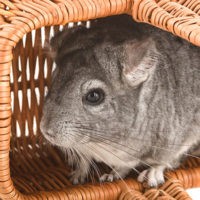Are you considering adopting a chinchilla? These little balls of fluff really are quite charming. However, they do have some unique needs, so it’s important to do some research before adopting one. An Ellicott City, MD vet discusses chinchilla care below.
Buddies
Chinchillas are very sociable, and live in groups—known as herds—in the wild. A single chinchilla will be very sad and depressed with no pals. We recommend getting at least two. Just keep only same-sex pairs together.
Cage
A good cage is an absolute must! These guys love to climb, so it’s important to choose one with lots of vertical space. The cage should have a solid floor, to hold bedding in and prevent injuries. The sides can be mesh or bars. These should be spaced under a half-inch apart. As for substrate, you can use aspen. Avoid hard wood substrates, such as pine and cedar.
Accessories
Your chinchilla will need some furnishings to be comfy. A dust bath is a must, as is a water bottle. It’s also important for your adorable pet to have comfy spots to relax and/or hide in, such as tents, hammocks, or pouches. Offer your furry friend lots of toys, such as blocks, ladders, tunnels, and mazes. Chinchillas also love climbing branches. Just be sure to use only safe woods, like pear, apple, willow, or hazelnut.
Location
Chinchillas are very timid. Your shy pet will feel anxious and frightened if he is surrounded by a lot of noise and commotion. Put the cage in a quiet spot where he can still see and hear you.
Temperature
Chinchillas overheat easily, and are most comfortable around 68 °F. Your little buddy’s room should never go above 80 °F.
Food
Chinchilla diets should consist mostly of fresh grass hay. Commercial food, such as pellets, is fine for your pet’s breakfast and lunch. For treats, you can offer berry leaves, rose hips, nuts, and dried fruit. Ask your vet for specific advice.
Veterinary Care
Just like any other pet, chinchillas need regular veterinary care. Ask your vet to recommend an appointment schedule. At home, watch for signs of illness, such as lethargy, drooling, red/runny eyes, loss of appetite, diarrhea, and respiratory issues. Call your vet immediately if you notice anything unusual.
Please contact us, your local Ellicott City, MD pet hospital, with any questions or concerns about chinchilla care. We’re here for you!





